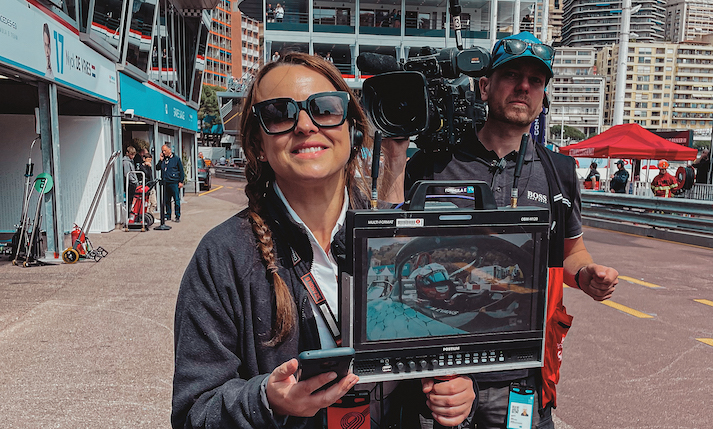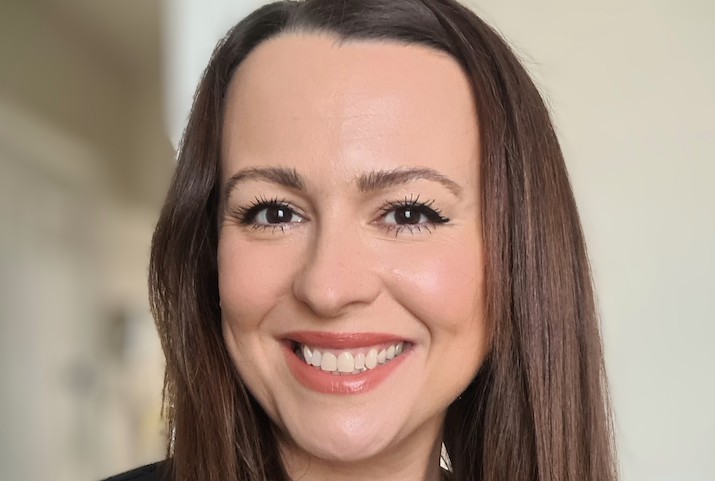Champion co-ordinator: Aurora’s Carla Murphy on managing motorsport with ease

Murphy at the ABB FIA Formula E World Championship – Monaco E-Prix, May 2022
Carla Murphy has a knack for organisation, a talent that’s stood her in good stead on more than one occasion. Over the course of her career, this production executive at Aurora, responsible for supervising production on the Formula E single-seater motorsport championship for electric cars, has done everything from organising a fashion shoot on a French mountain to overseeing a world record-breaking ‘wall of death’ performance for Channel 4.
Murphy has a challenging job, especially the ‘on-call’ aspect of it. “Being responsible for my own team, as well as freelancers – of which there are about 80 – it can feel like the emails, WhatsApp messages and calls never end; and no two issues are the same,” she says. “I will be the first to admit that I perhaps don’t protect myself as much as I should, but I feel as though I need to be available for the team and crew who are working so hard to help produce globally renowned live events.”
Then there’s the constant need for specialist crew and the difficulties faced when multiple large sporting events happen simultaneously, which has certainly been the case for Murphy during the bounce back from the pandemic.
“Working in motorsport, or sports broadcasting in general, can be quite tricky when locking down key talent as there isn’t an abundance of crew to cater for all the events that happen on any one sporting calendar year,” she adds. “Truthfully, I believe the reason behind this is that there is more funding in the factual and entertainment worlds, so the young trainees are likely to be drawn to roles in those domains rather than sport. However, I must be biased and say that working in sports pays hugely in other ways: it will take you to the far corners of the earth to cover thrilling sporting events broadcast on a global stage.”
Training wheels
Although her first job in TV was production assistant at the BBC, Murphy’s introduction to production of any kind came during her third year of studying French at the University of Manchester. As is typical, that year of the course is spent in the country of the language being studied, and it was in Paris that Murphy answered an ad looking for a production assistant for fashion photography.
“I was lucky enough to be offered the position and spent the following year working on major fashion campaigns and editorial shoots,” she explains. “After a year of relentless shoots and going from questions like ‘what is a call sheet?’ to ‘how do we get 16 children onto Mont Blanc?’ it turned out that I had a knack for planning. I set out to continue that path after finishing my degree, with a particular motivation to explore the world of TV.”
Taking inspiration from her sports-mad mother, Murphy sought to break into the sports broadcasting side of the industry. “I thought that would make her truly proud of me,” she recalls. “I think over the years, after covering a multitude of live sporting events, that I may have just achieved that.”
However, that was in the future. Applying for a spot in the BBC talent pool for production assistants, Murphy was fortunate enough to be offered a placement as soon as she finished university.
“[Beginning as] ‘post production assistant – factual’ at the BBC, I was essentially the middle man between the media managers and the productions when it came to their post-shoot schedules,” she explains. “I would schedule ingest, book out tapes and camera cards, book edit suites, and discuss codecs and timelines for the project. I was thrown in the deep end, but I loved every minute of it.
“This was a whole new world of TV production that I never thought about,” she continues. “It felt like I was given the opportunity to round off the lessons that I had already taken onboard, and it gave me, quite quickly, the information needed for decisions regarding my career path.”

Murphy: ‘I thrive on the aspect of conquering large projects’
After “trying to talk to everyone in the sports department as soon as I started at the BBC”, Murphy was able to switch to sports and bag the production management assistant role for F1.
“I then remained at BBC Sport for six years becoming a production co-ordinator and gallery script supervisor,” she adds. “Over the years I worked on F1, World Championship Athletics, The Boat Race, MOTD and MOTD2.”
The factual world
Leaving the BBC in 2015, Murphy moved into factual entertainment. It was here, working for North One Television as a production manager, that she was involved in helping British motorcycle racer Guy Martin take on a ‘wall of death’ for a 2016 Channel 4 special.
“I’m incredibly lucky to have been a part of many talented production teams, but I think ‘Guy Martin’s Wall of Death Live’ is up there as the coolest thing I’ve worked on in the course of my career,” she says. “We secured a hangar in Lincoln in order to build a colossal wall of death with Guy Martin only having three weeks to learn how to take it on – and he did it after recently breaking his back. Not only did he come away unscathed, albeit a little disorientated from the G-Force, but he also came away with a Guinness World Record which I feel the crew personally won as well! It’s certainly an event I’ll never forget.”
A couple of C4 factual entertainment shows for Full Fat TV followed, and then Murphy moved to Toronto and for two years remained in the non-live world, with production manager credits for two Vice documentaries. After six months with the National Film Board of Canada, working on feature-length documentaries for the Toronto International Film Festival and a virtual reality (VR) immersive project, she returned to the UK.
By staying close with previous contacts at North One, particularly head of production Robert Gough, Murphy was alerted to the production manager vacancy on Formula E (All3Media group companies Aurora Media Worldwide and North One are host broadcasters for the electric car off-road race series). “I jumped at the chance,” says Murphy.
“It was my opportunity to get back into the world of live sports production – something I had missed greatly over the years,” she continues. “I’d felt I owed it to myself to stick with different opportunities, but I realised that live sports broadcast was the path for me.”
Murphy was in for a bit of a shock though, as she sought to reintroduce herself to not only the world of sport but also British productions.
“There are stark differences between the British and Canadian ways!” she exclaims. “Also, this was my first insight into overseeing a host broadcast, and not being the broadcaster that latches on to the world feed. I’d had some experience with it during my years at the BBC, but being in charge was now the challenge. I thrive on the aspect of conquering large projects, so the difficulty wasn’t in ‘getting’ the role, but more in managing to keep hold of it and ensure it was of the quality Aurora Media Worldwide expects of its production team.”
She has obviously succeeded in this role, being promoted to production executive last year.
“I don’t feel that it has dramatically changed my approach and capacity,” she observes. “I’m still a very hands-on member of the production team; I love to get involved in the full spectrum of conversations. However, since we have moved the production forward, becoming a fully remote operation with live coverage being produced from the event location and White City in London, I’ve certainly had to adapt. Working across two sites at once definitely forced me to stop and reanalyse how my team and I seamlessly deliver the production to our client – it’s no mean feat!”
Challenges in the workplace
Murphy feels that the general external perception of production management (PM) is “extremely conflicting and challenging at times”.
“Although we’re the team pulling the longest hours and ensuring questions are answered before they’ve even been asked, it’s hard to get a seat at the table of recognition,” she says. “The fact that it’s a predominantly female-dominated area is also not a coincidence, or so I feel. The sports broadcast industry is quite binary insofar that women tend to go down the production management route, while for men, it’s the editorial or more creative route. Although Aurora Media Worldwide is doing so much to combat this with a raft of incredible female producers and editors, it’s still something that needs to be tackled. I have worked hard over the course of the last five years with Aurora Media Worldwide to ensure that the PM team are heard and understood. It’s important to have open and honest conversations with regards to what we need to do for our jobs for the production. I think this is key in combating the challenges. Half the time, these challenges arise because the information isn’t readily available to your counterparts, so regular check-ins and stand-ups are needed to ensure the production runs smoothly.”
“In such a male-dominated industry, it never ceases to put a smile on my face when I see young women come through the ranks to create, produce and deliver content that will be seen and felt by millions”
But Murphy has advice for other women looking to move into a role in sports broadcasting like hers: “Nothing is off limits and there is a space for you on a team if you’re dedicated and motivated. There are so many teams, groups and organisations that champion women in sports broadcast, and I feel with a little research you’ll see just how many roles are on offer – not just in production management. In such a male-dominated industry, it never ceases to put a smile on my face when I see young women come through the ranks to create, produce and deliver content that will be seen and felt by millions. Who wouldn’t want to be a part of that?”
Being part of it is what Murphy really enjoys, that and, “the immeasurable feeling of achievement as soon as you have successfully delivered an event”.
“The schedule is quite relentless, but you know that you are always edging closer to finishing another season of thrilling electric motorsport for the broadcasters, promoters and fans. The events that see our TV compound housed in the fan zone are among the most special; you can feel the excitement and buzz from what you’re helping to deliver. Nothing beats it.”
She’s also proud of the company as a whole. “Outside of the groundbreaking achievements of Formula E in the past few years and their plans to lead with technical innovation in motorsport, my colleagues covering the Super League Triathlon definitely deserve recognition,” she notes. “The production and programming took the series to another level and gained huge numbers of new fans – my mother included! It’s an excellent and well-put-together show that I hope Aurora Media Worldwide continues to deliver.
“People probably always say this, but sport is incredible at bringing people together,” she adds. “More often than not, a sporting team, or individual, helps family and friends to start, or continue, lifelong bonds. It has always given me a huge sense of pride to know that I was at a particular event that touched people around the world, and there is nothing quite like helping to deliver an event and broadcast to the fans.”
